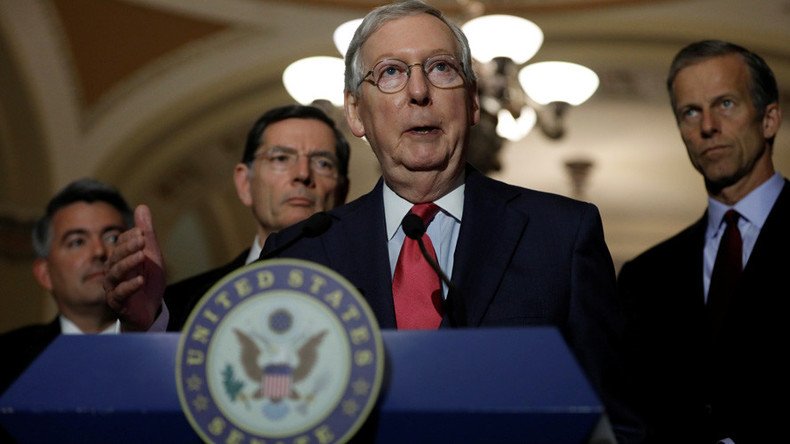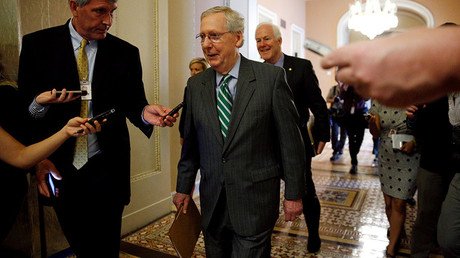Trump calls emergency meeting with Senate GOP, as vote on Obamacare repeal bill delayed

President Donald Trump summoned all GOP senators to the White House for an emergency meeting, as Senate Majority Leader Mitch McConnell delayed a vote to replace Obamacare over too many defections within his own party.
Trump started the meeting on Tuesday afternoon by calling Obamacare “a total disaster.”
“We have really no choice but to solve this situation,” Trump said, according to the White House. “So, we're going to talk and we're going to see what we can do. We're getting very close. But for the country, we have to have healthcare. And it can't be Obamacare, which is melting down.”
The president quickly asked the press to leave, after saying that he thought the Senate bill “is going to be great.”
After the meeting, Trump tweeted that the senators were “working hard” and would “get it right, unlike OCare!”
I just finished a great meeting with the Republican Senators concerning HealthCare. They really want to get it right, unlike OCare!
— Donald J. Trump (@realDonaldTrump) June 27, 2017
Speaking outside the White House, Senate Majority Leader Mitch McConnell (R-Kentucky) called the meeting with Trump “very helpful.”
“The president got an opportunity to hear from the various members who have concerns about market reforms and the Medicaid,” McConnell said. “The one thing I would say is that I think everybody around the table is interested in getting to yes.”
McConnell said that the bill will not be put to a vote until “a couple of weeks after this week.”
Members of the @SenateGOP leadership team brief the press on the Senate’s plan to bring #BetterCare to Americans. https://t.co/ljfqA9xC6F
— Senate Republicans (@SenateGOP) June 27, 2017
At Monday’s press briefing, White House Press Secretary Sean Spicer said that Trump had personally called several Republican senators who still oppose the Senate version of the bill. Spicer mentioned that Trump spoke with Senator Ted Cruz (R-Texas), Shelley Moore Capito (R-West Virginia), Ron Johnson (R-Wisconsin) and Senator Rand Paul (R-Kentucky) and said Trump felt “very positive” about their “ongoing” discussions.
Paul told Fox News that Trump was “very open-minded towards trying to make the bill a better bill.”
Paul objected to the fact that the current Senate bill keeps too many of the Obamacare regulations and subsidies, but said that he was open to supporting the bill as long as it was “more of a repeal bill and less of a big government bill.”
“We’ve got to look at all of that and we have to ask the people who elected us on repealing Obamacare if this bill is really a repeal?” Paul said.
Senators Rob Portman (R-Ohio) and Capito issued a joint press release on Tuesday after the Senate delayed the vote, announcing their opposition to the bill in its current form.
While Capito said she has “consistently” looked for ways to improve Obamacare, she said the current bill “will not ensure access to affordable health care in West Virginia, does not do enough to combat the opioid epidemic that is devastating my state, cuts traditional Medicaid too deeply, and harms rural health care providers.”
Portman also agreed that the Senate bill “falls short,” citing his concerns about the Medicaid policies in the bill, “especially those that impact drug treatment at a time when Ohio is facing an opioid epidemic.”
Cruz said he believes Republicans will be able to reach a deal on the health care bill, but he told the president that they need to focus on how to lower premiums.
“This is a process of bringing the conference together, uniting Republicans,” Cruz said, according to CNN. “I think we're making steady progress in that regard, but we still got a way to go.”
The Texas senator said he has been leading a working group to get Republican support for the bill for the past five months. He said their discussions have focused on “commonsense reforms that would expand options, expand competition, and give consumers more choices, which would lower premiums and make health insurance more affordable.”
Senator Mike Lee (R-Utah) released a statement on the Senate healthcare bill on Tuesday, saying that he was “happy” the vote had been postponed. Lee focused his criticism on the tax cuts in the bill, which he said, “ignored the middle-class families who have borne the brunt of Obamacare.”
“We’re going to continue discussion in our conference,” McConnell told reporters. “We’re still working towards getting at least 50 people in a comfortable place.”
It’s “a big complicated bill, they’re hard to bring together and hard to pass,” he added, describing Republicans as “optimistic that we’re going to get a result that’s better than the status quo.”
McConnell announced the delay on Tuesday afternoon, less than a week after his staffers released the Senate version of the bill to repeal and replace the Affordable Care Act (ACA), better known as Obamacare. At least six Republican senators have said they oppose the bill in its current form, with no Democrats expected to support it in any form. If more than two GOP senators defect, the bill will fail.
One no vote, Senator Dean Heller (R-Nevada), has been targeted by attack ads in his home state that were paid for by a pro-Trump super PAC. Heller is seen as a moderate, as well as one of the most vulnerable senators up for reelection in 2018.
The announcement comes less than 24 hours after the Congressional Budget Office (CBO) released its cost and coverage estimates of the Better Care Reconciliation Act of 2017. The CBO estimated that, under the Senate proposal, 22 million Americans would their health insurance coverage by 2026. The CBO assessment of the House bill in May said that 14 million Americans would lose insurance by 2018, while a total of 23 million would lose insurance within a decade.
Most of the people who would lose their insurance coverage would be those who are enrolled in Medicaid; by 2026, there would be 15 million fewer people on Medicaid. The cuts would be due to reduced federal payments for those enrollees starting in 2021.
“I have so many fundamental problems with the bill that have been confirmed by the CBO report that it’s difficult to see how any tinkering can address my fundamental and deep concerns,” Senator Susan Collins (R-Maine), a moderate and a confirmed no vote, told reporters after meeting with her fellow Republicans on Tuesday.
I want to work w/ my GOP & Dem colleagues to fix the flaws in ACA. CBO analysis shows Senate bill won't do it. I will vote no on mtp. 1/3
— Sen. Susan Collins (@SenatorCollins) June 26, 2017
McConnell wants a new CBO score, based on an update to the bill agreed to on Monday, Fox News reported. Monday’s amendment addresses the potential loophole left by the abolition of Obamacare’s individual mandate to purchase insurance. People who let their coverage expire for at least 63 days would be locked out of the insurance market for six months the following year, according to the amendment.
The House of Representatives version of the bill, the American Health Care Act (AHCA), went through a similar delay hours before an expected vote. House Speaker Paul Ryan (R-Wisconsin) was forced to pull the first version of the House bill in late March, saying the Republicans “just don’t have consensus.”
After six weeks, members of the conservative House Freedom Caucus and the moderate Tuesday Group reached a compromise, allowing the bill to squeak through the lower chamber 217-213, with no Democrats voting for it.
#BetterCareReconciliationAct halts medicare growth, require states to adhere to pre-existing condition requirements https://t.co/DleGWYYgUf
— RT America (@RT_America) June 26, 2017
Obamacare is supported by the majority of Americans, with 51 percent saying they view the health care law favorably, according to a survey by the Kaiser Family Foundation released last Friday. The AHCA is viewed unfavorably by 55 percent of Americans, and support for it among Republicans has dropped from 67 percent to 56 percent in the last month.
President Donald Trump has invited Senate Republicans to the White House Tuesday afternoon to discuss the bill.
“The president wants to get this done and done right,” White House press secretary Sean Spicer told reporters on Capitol Hill, saying that the meeting would be an opportunity for the president and senators to discuss a path forward.
McConnell praised Trump’s involvement in the process over the last week, saying the president has been “fully engaged.”
Republican Senators are working very hard to get there, with no help from the Democrats. Not easy! Perhaps just let OCare crash & burn!
— Donald J. Trump (@realDonaldTrump) June 26, 2017
“We always anticipated the president would be very important in getting us to a conclusion,” McConnell said, because “under our system, he’s the one with the signature.”
Collins, however, was less effusive.
“This president is the first president in our history who has had neither political nor military experience. And it has been a challenge to him to learn how to interact with Congress,” she said. “It would have been better if he had started with infrastructure, which has bipartisan support, rather than tackling a politically divisive and technically complex topic like health care.”













